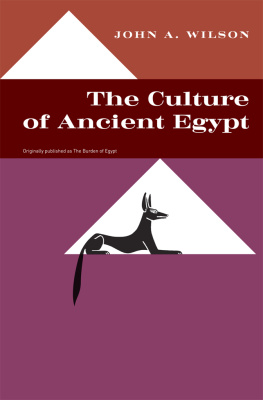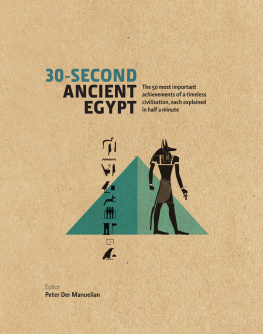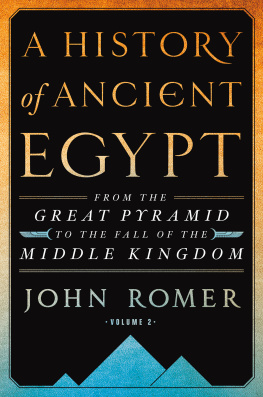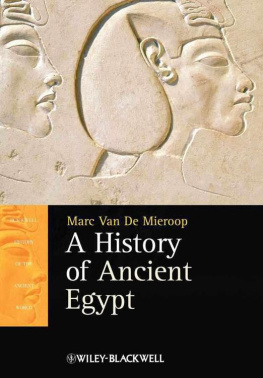THE CULTURE OF ANCIENT
EGYPT
JOHN A. WILSON
THE UNIVERSITY OF CHICAGO PRESS
CHICAGO AND LONDON
AN ORIENTAL INSTITUTE ESSAY
First published as THE BURDEN OF EGYPT
To Mary
THE UNIVERSITY OF CHICAGO PRESS, CHICAGO 60637
The University of Chicago Press, Ltd., London
1951 by The University of Chicago
All rights reserved
Published 1951. Paperback Edition 1956
Printed in the United States of America
16 15 14 13 12 11 10 09 08 07 21 22 23 24 25
ISBN-13: 978-0-226-14822-9 (e-book)
ISBN-13: 978-0-226-90152-7 (paper)
ISBN-10: 0-226-90152-1 (paper)
LCN: 56-4923
 The paper used in this publication meets the minimum requirements of the American National Standard for Information SciencesPermanence of Paper for Printed Library Materials, ANSI Z39.48-1992.
The paper used in this publication meets the minimum requirements of the American National Standard for Information SciencesPermanence of Paper for Printed Library Materials, ANSI Z39.48-1992.

The burden of Egypt. Behold, the Lord rideth upon a swift cloud, and shall come into Egypt.
ISAIAH, 19:1
How say ye unto Pharaoh: I am the son of the wise, the son of ancient kings? Where then are thy wise men?
ISAIAH, 19:1112
INTRODUCTION
This is not a history of ancient Egypt, but rather a book about ancient Egyptian history. The interest of the writer has not been in searching out and attempting to establish facts, in selecting chains of the most pertinent facts, and then in weaving those chains into a consecutive and meaningful story. Certainly, the writer is aware of the importance of working on historical fact, but his chief interest is not in validating facts. He takes certain data as given and then attempts to seek the significance of such assumed truth. Is there any justification for such a procedure and such an attitude?
A history book proper would attempt to maintain a maximum of scientific procedure and of objectivity. It could serve as a reference book for observations which had been recorded and checked for various periods of historical time. Such observed data would be presented in such a way that they could be verified, analyzed, and tested by other persons. Interpretation of the data, that is, the historians attempt to give them consequence and value, would be clearly defined, so that it might be discounted by other persons who desired to form their own independent opinions on the basis of the facts presented. The ideal would present a library of books on ancient Egypt, with source books and volumes of special studies leading up to a cultural history. Thus there would be the following: volumes of translations of all categories of ancient Egyptian texts, brought up to date and provided with adequate commentary to give the reader a control of the validity of the translations; volumes of systematic arrangement and analysis of the physical remains of ancient Egypt, including works of art, with adequate illustration and chronological specification to give the reader control of the data; volumes of special studies on religion, government, economics, social organization, industry, science, art, literature, etc., as well as various phases of those subjects; and the summing-up of the preceding materials in a sober cultural history, in which the source materials would, in so far as possible, speak for themselves. Only after such a presentation in objective terms should the subjectivity of the historian appear in speculative studies which pretend to give the significance and value of the story. Here we put the cart before the horse. In large measure the present study is such a speculative and subjective cart, which should have been preceded by the horses of detailed source materials and sober history.
Now most of our horses are lacking or sadly aged. Up-to-date translations of original Egyptian records are lacking. Analyses of physical remains appear somewhat haphazardly and incompletely. Systematic treatises on phases of ancient Egyptian culture are scanty or scattered. And there is no recent and first-rate history of ancient Egypt in English. The forthcoming new edition of the Cambridge Ancient History will meet a great need. Meanwhile, Breasteds A History of Egypt remains a standard, after forty years, because it is a single and consecutive telling of a story. Collaborative projects by different scholars, as in the Cambridge Ancient History, gain in authority at specific points by sacrificing unity and continuity. However, the raw materials upon which history is based have become so voluminous that it is increasingly difficult for one scholar to write adequately and comprehensively on all of ancient Egypt. For better and worse, we have become a generation of specialists.
Another problem which the ancient historian recognizes with increasing clarity is the peculiar nature of the sources upon which he must base his writing. What is a fact or what is a historical record from ancient Egypt? We have come to understand a little betterperhaps only a little betterthe psychology within which the ancient wrote his records. Our definition of a fact or of the truth would not be his. His motivations in his world were quite different from those in our world. In part, the present volume will try to show how the ancients psychology differed from ours; in part, the difference may be indicated here. The essential point for the present argument is that the ancient had an entirely different attitude toward any kind of observed process. We have come to think in terms of movement and consecution, of antecedents and consequents, of cause and effect. In order to understand an observed phenomenon, we want to know what preceded it and what brought it into being. We have come to think kinematically: that this particular frame of our experience has its proper setting within a strip of film. To the ancient, observed phenomena were not parts of a consecutive chain, so that their antecedents were not related and significant. To the ancient, phenomena were momentary flashes of a timeless and boundless universe, the realm of the gods and therefore always subject to divine control or intervention. He thought in terms of a mirror image: that this experience was an illustration of the plans of the gods as revealed from the beginning. If one accepts the principle of complete revelation, that the gods created a universe which has been essentially static from the beginnings, and if one is able to account for any phenomenon as effected by divine agency and therefore not open to human questioning, then there will be little occasion to seek out impersonal causes for our effects, and there will be no interest in the movement of time.
The ancient oriental mentality has been called a mythmaking mentality. The ancient related his personal experiences to myths which he told about the activities and interests of the gods. He found a real security in considering the particular only an aspect of the vast and undifferentiated. The reference of some observation or experience to a myth of divine agency relieved man of the responsibility of seeking impersonal causation in the past or of taking any exceptional measures for the future.
Since he lacked a sense of time, relativity, or impersonal causation, he was no historian. He was not interested in going back to a beginning to explain a phenomenon, but he was satisfied to find divine beginnings. He did not seek mundane origins and then try to trace events, chronologically and systematically, down to the present. Nor, apart from mythmaking, did he attempt to work out some philosophy of history, explaining the consecution of events through an interpretation of basic causes.
Next page







 The paper used in this publication meets the minimum requirements of the American National Standard for Information SciencesPermanence of Paper for Printed Library Materials, ANSI Z39.48-1992.
The paper used in this publication meets the minimum requirements of the American National Standard for Information SciencesPermanence of Paper for Printed Library Materials, ANSI Z39.48-1992.